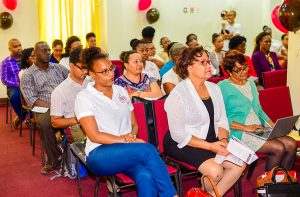THE Guyana Haemophilia Society (GHS) was officially launched on Tuesday and it was revealed that Guyana lacks awareness, experience, access to medication and treatment facilities when it comes to the fatal disease.
Joining in with the global celebration of World Haemophilia Day observed on April 17, the GHS utilised the opportunity to introduce itself to Guyanese at the event hosted in the conference hall of the National Library.
Present at the function were junior Public Health Minister Dr Karen Cummings, executive members of the GHS, medical personnel and individuals with the disease.
Haemophilia is an inherited bleeding disorder which prevents blood from clotting normally and for which there is no cure.
It results in bleeding, tightness, swelling and pain in the joints; bleeding in the brain after simple bumps and at times even spontaneous bleeding.
Haemophilia is a sex-linked disease which results in it being transferred only from mother to sons or from father to daughters.
It is estimated that there are 475,000 persons worldwide with haemophilia, while only 187,000 of these have been identified as patients.
In Guyana, it is estimated that there are 75 persons living with haemophilia, only five of which have been confirmed, thus far, by the society.
Director of the Georgetown Public Hospital Complex (GPHC), Dr. Pheona Mohamed-Rambaran, said Guyana is inexperienced in management of the disease.
The main treatment for haemophilia is through a replacement therapy known as a clotting factor, which Guyana does not produce and tests are sent abroad to be diagnosed, since this service is unavailable locally.
The clotting factor is therefore received through Project Share, a US-based humanitarian programme which donates blood-clotting medicines to developing countries.
However, Dr Mohamed-Rambaran said the quantity received from Project Share is inadequate to manage the country’s five identified patients, which points to a need for additional mechanisms to be put in place.
SPECIALISED CLINICS
She also highlighted the need for specialised clinics for persons with the disease, as they oftentimes are not given immediate attention for emergency cases when visiting public hospitals.
In addition, the director recommends the implementation of a haemophilia registry to monitor and manage patient cases, as well as home-therapy systems to cater for persons who suffer from mild bleeding.

The GHS is putting plans in place to become a part of the World Federation of Haemophilia which will see Guyana being assisted in the development of a national programme for testing and treatment, as well as for receiving additional products.
Addressing the gathering, Dr Cummings said the ministry pledges its full support to working with the GHS to bring about several improvements in the area of the disease.
These are to increase public awareness about haemophilia; to make available diagnostic capabilities at health facilities; establish and distribute necessary protocols and standard treatment guidelines; to ensure appropriate treatment options are available; and to establish a strong network with the blood bank.
“I do look forward to strong future collaboration between the Ministry of Public Health and the Guyana Haemophilia Society, which will ensure that persons living in Guyana diagnosed with haemophilia or other inherited blood disorders have access to and receive the highest quality of health care services available,” Cummings said.
She commended the previous works of the society and encouraged that efforts be continued to ensure the body becomes a part of the World Federation of Haemophilia.
Meanwhile, GHS President Laurence Bakhsh, who is also a patient with severe haemophilia, said psychologically, the disease is hard to live with and many sufferers often contemplate suicide.
Other common challenges relate to mobility, stigma, early on-set arthritis, unemployment, mental health challenges and hindrances to being involved in school and sports, apart from swimming.
Bakhsh said he anticipates support from the Ministry of Public Health and made recommendations to health workers to become fully aware of the unique needs of haemophilia patients.
“When we go to the emergency room we’re not supposed to be standing and waiting for a simple multi-vitamin which doesn’t necessarily help us. The doctors and nurses need to be more educated, especially the clinics, because those are our first response,” he stated.
Also delivering brief remarks was Director of the National Blood Transfusion Service (NBTS) Pedro Lucas, who congratulated the society and encouraged citizens to participate in blood donations.
He acknowledged that every person must play a part in supporting the lives of others, even as the blood bank seeks to improve on its own standards to meet the needs of the country.
The GHS founded and registered in March 2017 by Laurence Bakhsh, Lloyd Bakhsh and Freda Figueira, aims at highlighting the plight of persons with haemophilia.
This year, World Haemophilia Day is being celebrated under the theme “Sharing Knowledge makes us stronger”, marking its 28th anniversary, having first begun in 1989 by the World Federation of Haemophilia.





.jpg)








